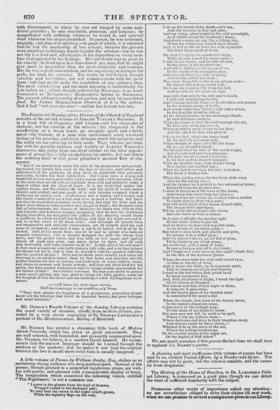The Fourteenth Number of the Divines of the Church of
England consists of the second volume of JEREMY TAYLOR'S Sermons. It is a book full of eloquence and wisdom—not the eloquence of rhetoric; nor the wisdom of the schools : the eloquence is the overflowing of a warm heart, an energetic spirit, and a fertile mind—the wisdom, of a man who understands every wayward feeling of the creature, and every delusion which the sanguine and the wilful are too apt to lay to their souls. They who are not familiar with the peculiar richness and fertility of JEREMY TAYLOR'S discourses, may judge from one short extract on the false appearances of prosperity,—fully exemplifying his merits, but not above the ordinary level of this great preacher's musical flow of eloquence. " But if we should look under the skirt of the prosperous and prevailing tyrant, we should find, even in the days of his joys, such allays and abatements of his pleasure, as may serve to represent him presently miserable, besides his final infelicities. For I have seen a young and healthful person warm and ruddy under a poor and a thin garment, when at the same time an old rich person hath been cold and paralytic under a load of sables and the skins of foxes. It is the body that makes the clothes warm, not the clothes the body : and the spirit of a man makes felicity and content, not any spoils of a rich fortune wrapped about a sickly and an uneasy soul. Apollodorus was a traitor and a tyrant, and the world wondered to see a bad man hi:ve so good a fortune, but knew not that he nourished scorpions in his breast, and that his liver and his heart were eaten up with spectres and images of death ; his thoughts were full of interruptions, his dreams of illusions; his fancy was abused with real troubles and fantastic images, imagining that he saw the Scythians flaying him alive, his daughters like pillars of fire dancing round about a cauldron, in which himself was boiling, and that his heart accused itself to be the cause of all these evils. And although all tyrants have not imaginative and fantastic consciences, yet all tyrants shall die and come to judgment ; and such a man is not to be feared, not at all to be envied. And, in the mean time, can he be said to escape who bath an unquiet conscience, who is already designed for hell—he whom God hates, and the people curse, and who hath an evil name, and against whom' all good men pray, and many desire to fight, and all wish him destroyed, and some contrive to do it Is this man a blessed man ? Is that man prosperous who bath stolen a rich robe, and is in fear to have his throat cut for it, and is fain to defend it with the greatest difficulty and the greatest danger ? Does not he drink more sweetly that takes his beverage in an earthen vessel, than he that looks and searches into his golden chalices for fear of poison, and looks pale at every sudden noise, and sleeps in armour, and trusts nobody, and does not trust God for his safety, but does greater wickedness only to escape awhile unpunished for his former crimes ? Auro bibitur venenum. No man goes about to poison a poor man's pitcher, nor lays plots to forage his little garden, made for the hospital of two bee-hives and the feasting of a few Pythagorean herbeaters.
70,any vrAlov gpirru .raivrac, Oa goo, ivAzeo,ixv ;fa; d 4465.w 14 ill gvEsup.
"They that admire the happiness of a prosperous, prevailing tyrants know not the felicities that dwell in innocent hearts, and poor cottages, and small fortunes."
























 Previous page
Previous page